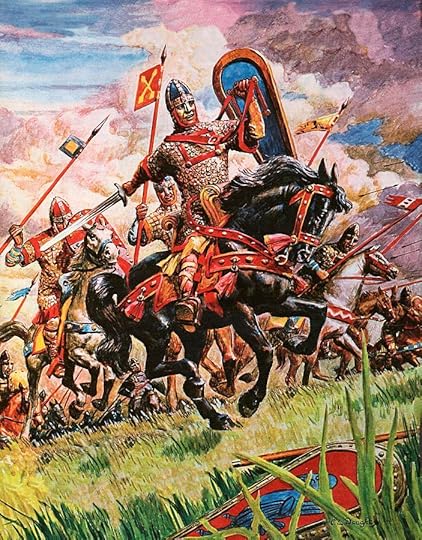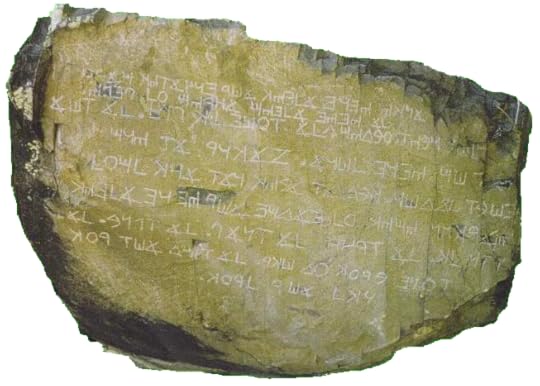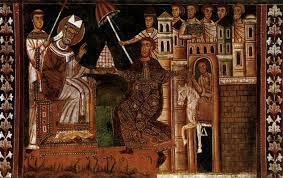Michael Rank's Blog, page 17
January 13, 2014
HFM 052 | The Norman Invasion of 1066: Why England Took 400 Years to Assimilate its Own Kings
 When the Normans invaded England in 1066, they did not assimilate into the culture quickly. In fact, becoming fluent in the language took the kings and aristocracy nearly 400 years! What kept them so stuck in their old customs, and what caused them to finally learn English?
When the Normans invaded England in 1066, they did not assimilate into the culture quickly. In fact, becoming fluent in the language took the kings and aristocracy nearly 400 years! What kept them so stuck in their old customs, and what caused them to finally learn English?
Like this podcast?
January 6, 2014
HFM 051 | History’s Greatest Alchemists, Part 3: Ge Hong (283-343) The Chinese Polymath Who Sought Immortality, with Travis Dow of the History of Alchemy Podcast
[image error]In this third part of our series on history’s greatest alchemists, we step out of Europe and the Middle East and explore the life of Ge Hong, a government official best known for his interest in Daoism, alchemy, and attempts at immortality. Did he stumble onto the recipe for limitless life?
Check out Travis’ History of Alchemy Podcast by clicking here.
Like this podcast?
December 30, 2013
HFM 050 | History’s Greatest Alchemists, Part 2: Al-Ghazali (1058-1111) Medieval Islam’s Foremost Intellectual Who Was Most Concerned with The Alchemy of Happiness, with Travis Dow of the History of Alchemy Podcast
[image error]The foremost intellectual in the medieval Islamic world was a theologian, juristic, mystic, and philosophy. He wrote a landmark treatise in which he attempted to construct a unified explanation of human knowledge. But what was the branch of knowledge that he thought tied in all the sciences together? Alchemy, of course!
Check out Travis’ History of Alchemy Podcast by clicking here.
Like this podcast?
December 23, 2013
HFM 049 | History’s Greatest Alchemists, Part 1: Isaac Newton (1642-1727), the Father of Modern Physics, Who Would Rather be Transmuting Metals into Gold, with Travis Dow of the History of Alchemy Podcast
 Think that Isaac Newton was only interested in advancing science and banishing all forms of superstition or empirical research? Think again! Find out how the father of modern physics and mathematics spent far more of his time attempting to unlock the secrets of transmuting base metals into gold and figuring out the date for the end of the world.
Think that Isaac Newton was only interested in advancing science and banishing all forms of superstition or empirical research? Think again! Find out how the father of modern physics and mathematics spent far more of his time attempting to unlock the secrets of transmuting base metals into gold and figuring out the date for the end of the world.
Check out Travis’ History of Alchemy Podcast by clicking here.
Like this podcast?
December 16, 2013
HFM 048 | Lost Civilizations, Part 3: Ancient American Explorers: The Unknown Adventurers Who Arrived a Millennium Before Columbus
 Archeologists have discovered hundreds of remains of ancient cultures who arrived at America centuries before Columbus, including the Phoenicians, Romans, Chinese, and Polynesians. But who came first, and why didn’t they stay? Find out in these week’s podcast episode!
Archeologists have discovered hundreds of remains of ancient cultures who arrived at America centuries before Columbus, including the Phoenicians, Romans, Chinese, and Polynesians. But who came first, and why didn’t they stay? Find out in these week’s podcast episode!
Like this podcast?
December 9, 2013
HFM 047 | Lost Civilizations, Part 2: The Pyramid Builders: Skilled Craftsmen to Some, Visitors from Another Planet to Others
[image error]Did slaves actually build Egypt’s pyramids or was it really the work of aliens, as the History Channel and wild-haired conspiracy theorists suggest? We hoped for the former but found it to be the latter.
Like this podcast?
December 5, 2013
New Book “Lost Civilizations” Is Out — Only $0.99 for a Limited Time!
 My new book “Lost Civilizations: 10 Societies that disappeared without a trace” is out today. You can get it from Amazon.com for a limited time for only $0.99!
My new book “Lost Civilizations: 10 Societies that disappeared without a trace” is out today. You can get it from Amazon.com for a limited time for only $0.99!
Description: From the #1 bestselling author of History’s Greatest Generals comes an exciting new book on the greatest societies in history that vanished without a trace, and why their disappearance still haunts us today.
Whether it is Plato’s lost city of Atlantis, a technological advanced utopia that sank into the ocean “in a single day and night of misfortune”; the colony of Roanoke, whose early American settlers were swallowed up in the wild forest lands of the unexplored continent, or the Ancient American Explorers, who managed to arrive to the New World 2,000 years before Columbus, the disappearance of these societies is as cryptic as it is implausible.
This book will look at cultures of the 10 greatest lost civilizations in history. Some were millenia ahead their neighbors, such as the Indus Valley Civilization, which had better city planning in 3,000 B.C. than any European capital in the 18th century. Others left behind baffling mysteries, such as the Anasazi, whose cliff-dwelling houses were so inaccessible that every member of society would have to be an expert-level rock climber.
It will also at explanations as to how massive societies that lasted for centuries can disappear without a trace. Did the builders of the pyramids handy craftsmen whose method of transporting massive stones are still unexplainable simply disappear or were they part of an advanced alien race, as conspiracy theorists assert? Was the Kingdom of Aksum really the keeper of the Ark of the Covenant, and did this lead to their downfall?
Whatever the nature of their disappearance, these lost civilizations offer many lessons for us today — even the greatest of societies can disappear, and that includes us.
HFM 046 | Lost Civilizations, Part 1: Atlantis: Did the Greatest Society that Ever Existed Ever Exist?
[image error]Is there any good reason to believe that an advanced society that existed 11,000 years ago really exist, or do we have to take Plato’s word for it? Find out today in this episode.
Like this podcast?
December 1, 2013
HFM 045 | The Biggest Forgeries in History, Part 2: The Protocols of the Elders of Zion
[image error]How did this fake document that was printed in 1897 in Russia and stuffed full of wild conspiracy theories against the Jews end up responsible for anti-semitism in the 20th century, the rise of the Nazi Party, and possibly the Holocaust? Find out in this week’s episode, and why the Protocols of the Elders of Zion is sadly influential to this day.
Like this podcast?
November 25, 2013
HFM 044 | The Biggest Forgeries in History, Part 1: The Donation of Constantine
 How did an anonymous medieval clergyman try to forge a letter from Emperor Constantine to Pope Sylvester justified all the land holdings of the Roman Catholic Church? Find out in this week’s podcast.
How did an anonymous medieval clergyman try to forge a letter from Emperor Constantine to Pope Sylvester justified all the land holdings of the Roman Catholic Church? Find out in this week’s podcast.
Like this podcast?



